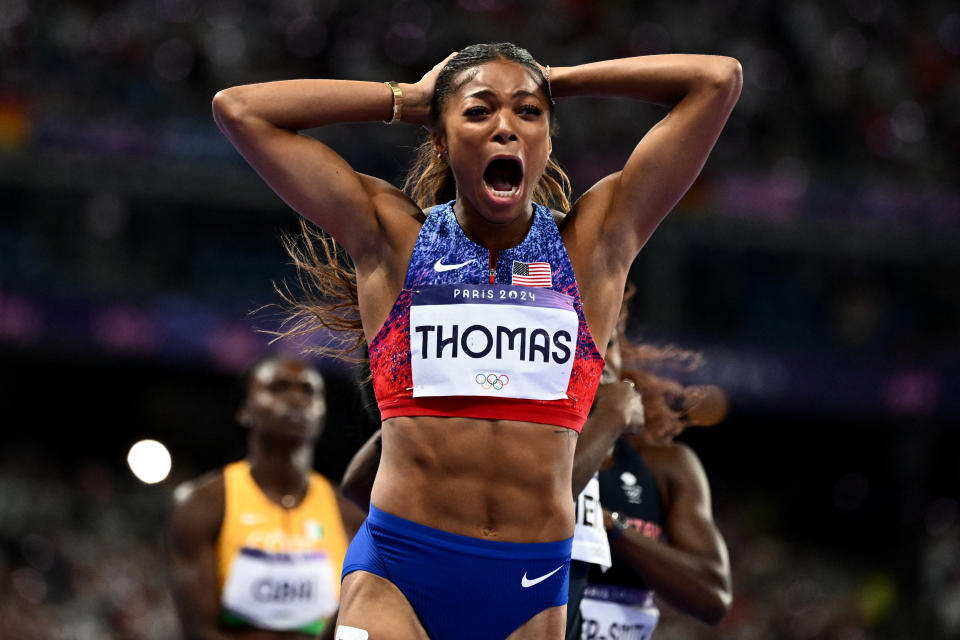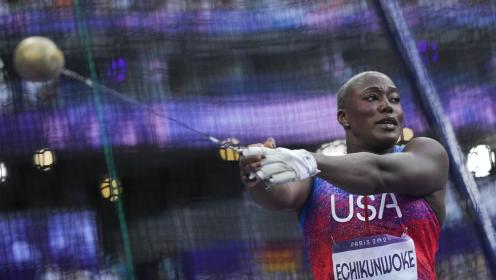
Medal table | Olympic schedule | How to watch | Olympic news
SAINT-DENIS, France — Gabby Thomas made a revealing comment earlier this summer when speaking about what it would be like to come to the Olympics as a gold-medal favorite.
Thomas, at 27 one of the leading women of American sprinting, said she can’t buckle under the weight of expectations if she hopes to be remembered as a legend of her sport.
“Great athletes are built under pressure,” Thomas said. “If I want to be a great athlete, if I want to be amongst the names like Sanya [Ross], Allyson [Felix], Carmelita [Jeter], Dawn [Harper-Nelson], I have to compete under pressure and accept that’s part of it.”
The time to let her feet back up those words arrived at last on Tuesday night in front of another enthusiastic crowd at France’s largest stadium. Thomas emerged from the Stade de France tunnel just before the start of the Olympic 200 meters final, raising her arms in the air and smiling on the way to her starting block in lane 7.
One lane to Thomas’ right was St. Lucia’s Julien Alfred, the 100-meters champion who bested Sha’Carri Richardson and captured her Caribbean nation’s first-ever medal. One lane to Thomas’ left was fellow American Brittany Brown, who arrived in Paris in the form of her life and then cruised to victory in her Round 1 and semifinal heats. Those two figured to pose the biggest threat to Thomas after Tokyo Olympic champion Shericka Jackson withdrew due to injury.
It didn’t take long for Thomas to show that nobody was going to keep her from Olympic gold in her signature race. She pulled away from Alfred and Brown rounding the curve and maintained that gap as she streaked toward the finish line.
Thomas won Olympic gold in 21.83 seconds, placing her hands on her head in disbelief as she crossed the finish line and then draping an American flag over her shoulders. Alfred placed second in 22.08 to win her second medal in three days — and her country’s second medal ever. Brown finished third in 22.20, giving the U.S. two runners on the podium.
“I envisioned this race over and over from start to finish,” Thomas said. “I have been envisioning it ever since I made the team back in June. And I was not prepared for how I was going to feel when I crossed the line as an Olympic champion. There’s no way to prepare yourself for that.”
“There were so many emotions flooding me — happiness, joy, pride, disbelief, shock all at once. It was the happiest moment of my life.”
What makes Thomas’ achievement all the more impressive is that track isn’t her sole focus. The Harvard grad, who received a master’s in public health last year from the University of Texas, works part-time at an Austin volunteer clinic for people without insurance.
How does one of the fastest women in the world balance all of that? She has long insisted that she’s at her best when she comes home from training and has something besides track on which to focus.
Three years ago, when she was just a wide-eyed 24-year-old, Thomas emerged seemingly out of nowhere at the U.S. Olympic Trials. She ran what was then the fastest 200 since Florence Griffith Joyner set a world record that has stood virtually unchallenged since 1988.
At the Tokyo Olympics, Thomas finished third behind Elaine Thompson-Herah of Jamaica and Christine Mboma of Namibia. It wasn’t gold, but Thomas was satisfied at the time.
Her outlook was different going into Paris 2024. She was a veteran now, an Olympic bronze medalist and World championships silver medalist in the best form of her career.
Thomas wanted gold. Nothing else would suffice.
Alfred said she knew there was no catching Thomas with about 80 meters to go.
“Coming off the turn, I think I kind of gave up on myself, mentally and physically,” she said. “I wasn’t fighting for the gold anymore. I was just fighting to get a medal.”

